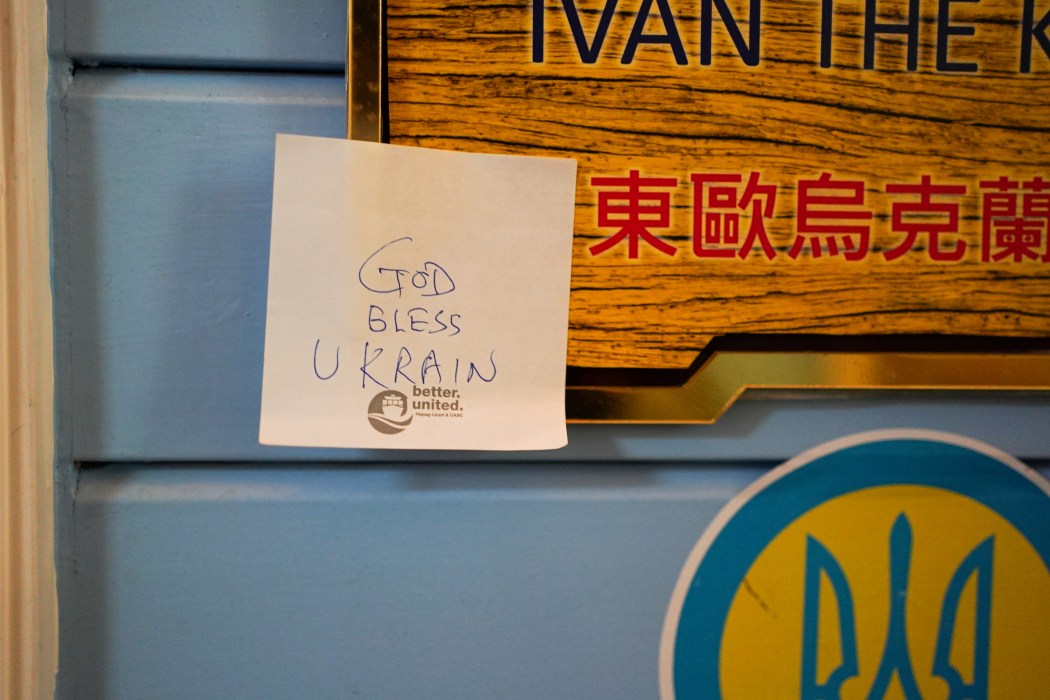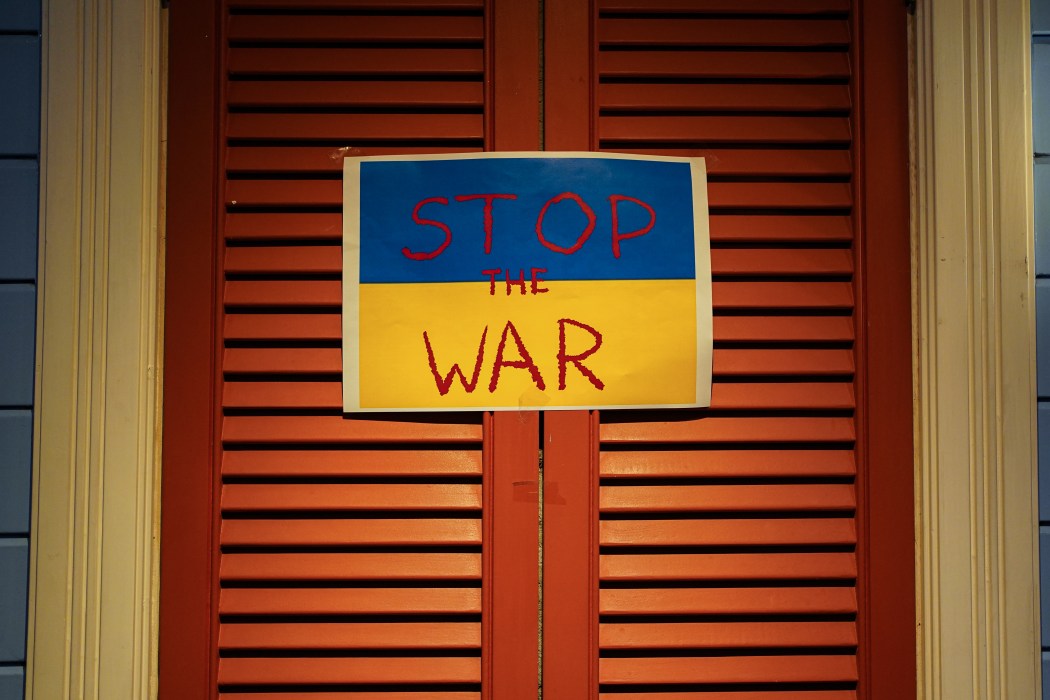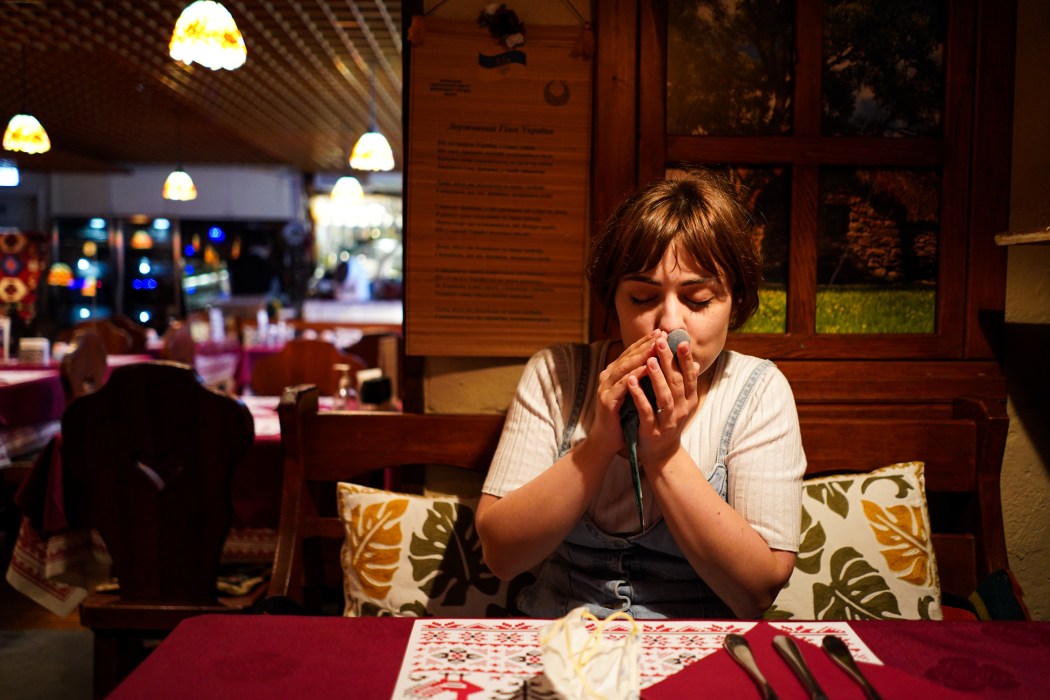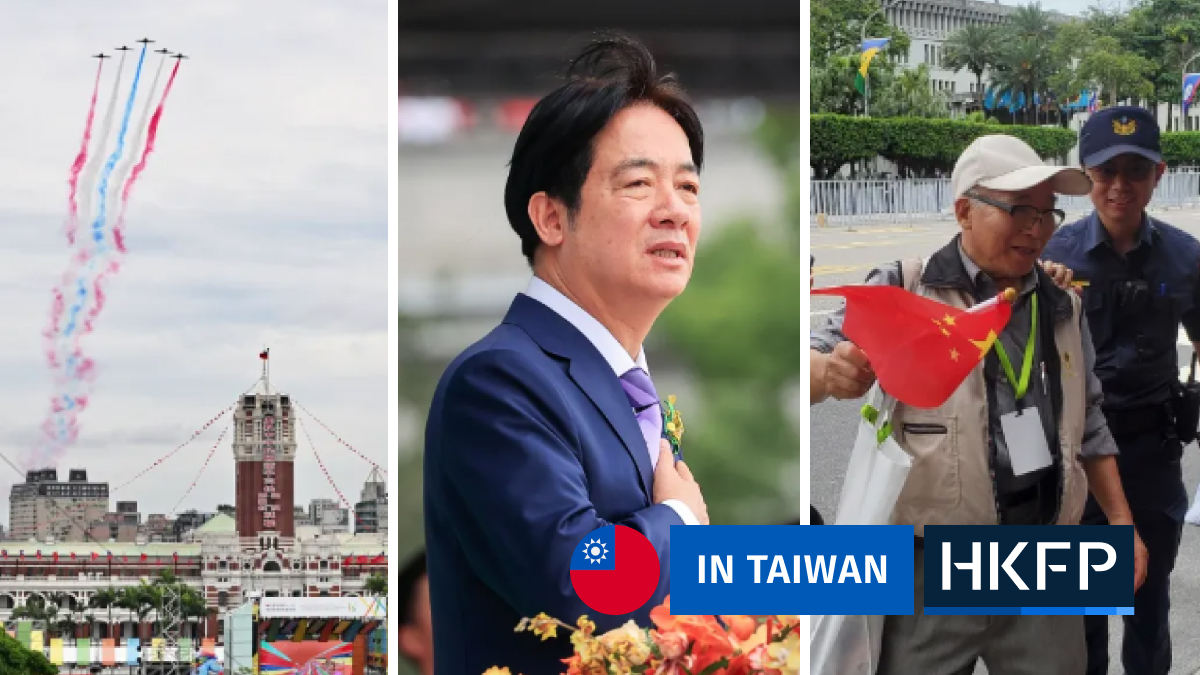Twenty-one years ago, Vicktoriia Tkachuk’s parents opened a Ukrainian restaurant in Hong Kong’s Central district. They called it Ivan The Kozak.
Kozak, or cossacks, are “a group of people who don’t belong to the government, like free warriors,” Tkachuk said. “They fight for what they think needs to be fought for.”

On February 24, Russian troops invaded Ukraine. Fierce fighting has taken place across the country since, including in the capital Kyiv, where Tkachuk’s family is from. Her grandparents are still there.
The 30-year-old, who is the manager of her parents’ eatery, called the invasion led by Russian President Vladimir Putin a “stupid move.” Last Tuesday, she printed “stop the war” posters featuring the Ukrainian flag, and gathered the restaurant’s employees for a photo in protest against the conflict.
The posters now adorn the entrance to the eatery. Next to a sign bearing the restaurant’s name, a customer has placed a handwritten sticky note that reads: “God Bless Ukrain[e]”.
Since the invasion, some Hongkongers have even left stacks of cash, asking Tkachuk to donate it to Ukraine.
“Why did you hit me?”
Like many Ukrainians, Tkachuk is furious.
“Our points of view are different. It’s okay. Maybe [Ukraine and Russia] didn’t get along well in 2014. But now, it’s like, why do you hit me?!” she said.
“A lot of Russians are against war, they don’t even want conflict. But if they came out, they would just get thrown in jail.”

Talks between delegations from Ukraine and Russia are yet to yield fruit. According to the Pentagon, the Russian government has not shown any interest in a “deconfliction mechanism”. Last Sunday, Putin made another threat, saying that continued resistance would put Ukrainian statehood into question.
“Of course, I wish I was there. But then again, how much help would I be of?” Tkachuk said.
She learned of the conflict after being woken by a phone call early on February 24. On the other end of the line, with a quiver in her voice, Tkachuk’s mother said: “We have war.”
“Alcohol, many tears, many phone calls…” is how Tkachuk described the days that followed. And it was not just her. Tkachuk said Ivan The Kozak’s other employees were like “zombies” too.
Soviet memories
Before 1991, Ukraine was a part of the Soviet Union. In the immediate years after the collapse of the Union of Social Soviet Republics, Ukraine’s economy saw hyperinflation and high poverty rates.
As a child, Tkachuk didn’t have diapers – her mother used napkins instead. Traumatic stories of life under Soviet rule – of collectivisation, extreme poverty, the Chernobyl disaster – were passed down to Tkachuk from her mother.

So they left Ukraine, settling down in Hong Kong. Far from home, her mother struggled with depression and panic attacks, but was able to find some comfort when she met Russians living in the city. The shared language made her mother feel comfortable, Tkachuk said, since she did not speak Mandarin or Cantonese when she arrived in the city.
It was from her mother that Tkachuk learned to speak Russian, and she admits that she’s more fluent in it than Ukrainian.
Identity politics
The relationship between Ukraine and Russia stretches back centuries, and years of cultural and historical exchanges within Ukraine have created a nation that is ethnically and linguistically diverse. Ethnic Russians make up the largest minority group in Ukraine, and Russian is commonly spoken across the region, though in no small part because of Russification efforts during the imperial and Soviet eras.
But the relationship has grown fraught. Ukrainian electoral politics have been framed as a contest between pro-Russian and pro-Western candidates, and expressed desires to join NATO and the European Union have culminated in tense identity politics. Divergent memories of history have added to the conflict.
Much of this culminated in the 2014 Maidan revolution that ousted pro-Russian Ukrainian president Viktor Yanukovich, and, only a month later, the Russian annexation of Crimea.

When Tkachuk was little and people asked her nationality, she would say “Russian” without much thought.
“You’re Ukrainian!” her mum would angrily correct. After Russia annexed Crimea, her mother began speaking to her in Ukrainian instead of Russian.
The Russia-Ukraine war has also revealed people’s views, or in the eyes of some Ukrainians, their humanity. Tkachuk said that she had stopped working with a long-time supplier after the owner openly declared his support for Putin.
“Everyone’s saying, ‘oh we don’t know about all this government stuff.’ But no, you know when a bully is a bully,” Tkachuk said.
Hongkongers show support
When Tkachuk’s mother first arrived in Hong Kong, her nursing certification was not recognised, so she waited tables at a Russian restaurant. After it closed, she decided to open a Ukrainian restaurant with her Chinese husband, naming it Ivan after him.
The restaurant is adorned with a collection of cultural and religious knick-knacks, paired with wooden coffered ceilings and Tiffany lamps to create a uniquely eastern European environment.
However, online dining guide OpenRice lists Ivan The Kozak as offering Russian cuisine. Tkachuk has asked the platform to change its categorisation to Ukrainian or even eastern European, but to no avail.

“It’s alright. Once they arrive at our front door they’d know we do Ukrainian,” Tkachuk said. The blue-and-yellow Ukraine flags, posters and slogans that plaster the entrance leave diners with little doubt over which cuisine they will be eating.
In 2014, Tkachuk’s mother printed a message in the menu saying that Russia was the only one responsible for the invasion and annexation of Crimea. According to Tkachuk, some Russian guests left their tables after reading the menu.
In 2019, the first page of the menu was replaced with slogans of solidarity with Hong Kongers.
“It’s quite stressful. Hong Kong quiets a bit, and then Ukraine has problems; and then Ukraine quiets a little bit, and then Hong Kong has problems,” she said, sighing.
Tkachuk appeared calm when speaking to HKFP, but said that whenever she closes her eyes, she sees her Ukrainian sisters and brothers suffering, and is not able to hold back her tears.

One thing that has provided her comfort is her small, sapphire-hued parrot, Hercules. It snuggled into her cupped palm as Tkachuk spoke to HKFP. Occasionally, it hopped onto her head and softly mussed her hair with its beak.
“Hong Kongers love Ukrainian food,” Tkachuk said, adding that “the most popular dish here is Chicken Kiev.” Ivan The Kozak has managed to keep running without financial difficulties despite the city’s strict social distancing measures, which include a ban on dining in restaurants after 6 p.m.
And after Russia invaded Ukraine, Hong Kongers flocked to the restaurant to show their support. Some left “Stand with Ukraine” memos, some shared how heartbroken they felt about the news, and some even placed stacks of cash on their table, asking the money to be donated to support Ukrainians.
Tkachuk’s brother donated the money to the armed forces right away, unsure of how long Ukraine would last.
The restaurant has expressed its gratitude on Facebook, writing “Dear Hongkongers! Thank you for your support! We see and feel it.”
“It’s been really busy these days. A week ago [before the invasion], we only had six to seven tables a day because offices have been closed and people have been working from home,” Tkachuk said.
She knew people had come for Ukraine.
Support HKFP | Policies & Ethics | Error/typo? | Contact Us | Newsletter | Transparency & Annual Report | Apps
Help safeguard press freedom & keep HKFP free for all readers by supporting our team

LATEST FROM HKFP
HKFP has an impartial stance, transparent funding, and balanced coverage guided by an Ethics Code and Corrections Policy.
Support press freedom & help us surpass 1,000 monthly Patrons: 100% independent, governed by an ethics code & not-for-profit.










